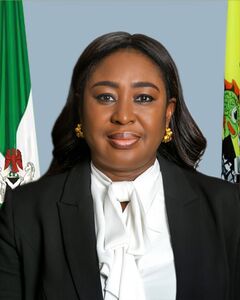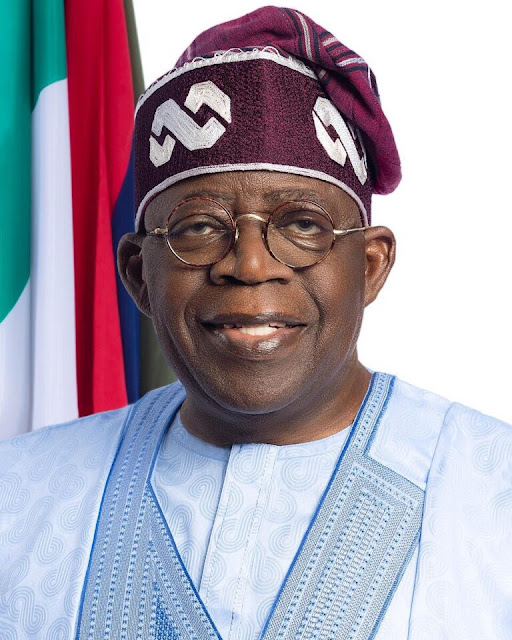In the dynamic and complex world of Nigeria’s maritime industry, few figures stand out as prominently as Ms. Vivian C. Richard-Edet, the newly appointed Executive Director of Finance and Administration at the Nigerian Ports Authority (NPA). Her appointment, announced in January 2024 by President Bola Ahmed Tinubu, marks a significant milestone in the leadership restructuring of one of Nigeria’s most critical economic institutions. With a career spanning decades in banking, finance, and administration, Richard-Edet brings a wealth of expertise to the NPA, positioning her as a pivotal figure in driving the agency’s financial strategy and operational efficiency. As Nigeria seeks to bolster its maritime sector to enhance economic growth, her role is both timely and transformative, earning her accolades as a financial luminary in the port authority’s evolving narrative.
A Strategic Appointment Amid Economic Reforms
The Nigerian Ports Authority, established under the Ports Act of 1954, is tasked with overseeing the country’s port operations, including the management of major ports such as Lagos Port Complex, Tin Can Island, Onne, Calabar, and Warri. These ports serve as gateways to Nigeria’s economy, facilitating over 90% of the country’s international trade. The NPA’s mandate includes ensuring efficient port operations, fostering trade, and generating revenue for the federal government. However, the agency has faced challenges such as bureaucratic inefficiencies, infrastructure deficits, and corruption, which have hampered its ability to maximize its economic potential.
In January 2024, President Tinubu approved the appointment of new executive directors for the NPA and the Nigerian Maritime Administration and Safety Agency (NIMASA), signaling a renewed focus on revitalizing the maritime sector under the Federal Ministry of Marine and Blue Economy. Ms. Vivian C. Richard-Edet was appointed as the Executive Director of Finance and Administration, alongside Engr. Olalekan Badmus (Executive Director, Marine and Operations) and Engr. Ibrahim Abba Umar (Executive Director, Engineering and Technical Services). These appointments were met with optimism, with stakeholders expressing confidence in the new leadership’s ability to enhance the NPA’s efficiency and contribute to Nigeria’s economic diversification agenda.
Richard-Edet’s appointment is particularly significant given the NPA’s critical role in Nigeria’s economy. The maritime sector contributes approximately 7% to the nation’s GDP, and its performance is closely tied to the country’s trade balance and foreign exchange earnings. With Nigeria facing economic headwinds, including a depreciating naira and reliance on oil revenues, the NPA’s ability to generate revenue and streamline operations is paramount. Richard-Edet’s financial acumen and administrative expertise position her as a key player in addressing these challenges and aligning the NPA with the government’s Renewed Hope Agenda, which emphasizes economic inclusivity and diversification.
A Multifaceted Career in Finance and Banking
Vivian C. Richard-Edet’s ascent to the role of Executive Director is underpinned by a distinguished career in finance and banking, marked by versatility and innovation. Her professional journey spans retail, small and medium enterprise (SME), commercial, and corporate banking, with expertise in trade finance, credit analysis, financial analysis, and product development. This multifaceted skill set equips her to navigate the complex financial landscape of the NPA, which requires balancing operational budgets, optimizing revenue streams, and ensuring fiscal discipline.
While specific details of her early career are not widely documented, her appointment reflects a deep reservoir of experience in financial management. The maritime sector, with its capital-intensive infrastructure projects and revenue-generating operations, demands a leader capable of implementing robust financial strategies. Richard-Edet’s background in banking suggests she has honed skills in risk management, financial forecasting, and stakeholder engagement—qualities essential for overseeing the NPA’s administrative and financial functions.
Her role as Executive Director involves managing the NPA’s budget, which includes revenues from port tariffs, concessions, and other services, as well as overseeing administrative processes to ensure operational efficiency. The NPA’s financial health is critical, as it funds infrastructure upgrades, staff welfare, and contributions to the federal treasury. Richard-Edet’s expertise in trade finance is particularly relevant, given the NPA’s role in facilitating international trade. By streamlining financial processes and enhancing transparency, she is poised to address longstanding issues such as revenue leakages and inefficiencies in port operations.
The NPA’s Strategic Importance to Nigeria’s Economy
The Nigerian Ports Authority is a linchpin of Nigeria’s economic framework, serving as the backbone of the country’s trade and logistics infrastructure. Nigeria’s ports handle a significant portion of West Africa’s maritime traffic, making them a regional hub for trade. The Lagos Port Complex and Tin Can Island Port, both under the NPA’s purview, are among the busiest in Africa, processing millions of tons of cargo annually. The Onne Port Complex, located in Rivers State, is a critical hub for oil and gas-related activities, while ports in Calabar and Warri support regional trade and industrial activities.
Despite its strategic importance, the NPA has faced persistent challenges, including port congestion, outdated infrastructure, and bureaucratic bottlenecks. These issues have led to delays in cargo clearance, high demurrage costs, and reduced competitiveness compared to ports in neighboring countries like Ghana and Togo. The appointment of Richard-Edet and her fellow executive directors is seen as a step toward addressing these challenges and positioning the NPA as a world-class maritime institution.
The creation of the Federal Ministry of Marine and Blue Economy in 2023, under the leadership of Minister Adegboyega Oyetola, underscores the government’s commitment to leveraging the maritime sector for economic growth. The ministry’s mandate includes modernizing port infrastructure, enhancing maritime safety, and promoting the blue economy, which encompasses sustainable use of marine resources. Richard-Edet’s role as Executive Director of Finance and Administration places her at the heart of these efforts, as financial discipline and strategic investments are critical to achieving these goals.
Leadership Transition and Organizational Impact
The appointment of Richard-Edet and her colleagues followed a period of leadership transitions at the NPA. The previous Executive Director of Finance and Administration, Ms. Adenrele Susanna Adesina, was replaced by Richard-Edet, while Engr. Olalekan Badmus succeeded Hon. Onari Brown as Executive Director of Marine and Operations. These changes reflect President Tinubu’s broader strategy to inject fresh perspectives into key agencies, aligning them with his administration’s economic priorities.
The Maritime Workers Union of Nigeria (MWUN), led by President-General Comrade Adewale Adeyanju, welcomed the appointments, expressing confidence in Richard-Edet and Badmus’s ability to drive positive change. The union’s endorsement highlights the high expectations placed on the new leadership to address operational challenges and improve working conditions for port workers.
Richard-Edet’s appointment was formalized during a welcoming ceremony at the NPA headquarters, where Managing Director Mohammed Bello Koko and the management team expressed optimism about the new executives’ contributions. The ceremony underscored the NPA’s commitment to fostering a collaborative and innovative leadership culture, with Richard-Edet expected to play a central role in financial reforms and administrative streamlining.
Challenges and Opportunities in the Maritime Sector
The Nigerian maritime sector faces a complex array of challenges that Richard-Edet must navigate in her new role. One of the most pressing issues is port congestion, particularly at Lagos ports, which handle the bulk of Nigeria’s cargo. Congestion has been exacerbated by inadequate road networks, inefficient customs processes, and limited automation. These bottlenecks increase the cost of doing business and deter foreign investors, undermining Nigeria’s competitiveness as a trade hub.
Another challenge is the need for significant investment in port infrastructure. Many of Nigeria’s ports rely on outdated facilities, which limit their capacity to handle modern vessels and cargo volumes. The NPA has embarked on ambitious projects, such as the Lekki Deep Sea Port, which became operational in 2023, and the modernization of Tin Can Island and Lagos Port Complex. Financing these projects requires careful financial management, as the NPA must balance capital expenditures with operational costs while maintaining fiscal sustainability. Richard-Edet’s expertise in financial analysis and product development will be critical in securing funding, whether through public-private partnerships, concessions, or international loans.
Corruption and revenue leakages have also plagued the NPA, with reports of mismanagement and illicit practices undermining the agency’s credibility. Richard-Edet’s role includes implementing robust financial controls to enhance transparency and accountability. By leveraging her banking experience, she can introduce best practices in financial reporting and auditing, ensuring that the NPA’s revenues are accurately tracked and utilized for strategic priorities.
On the opportunity front, the global shift toward the blue economy presents significant prospects for Nigeria. The country’s 853-kilometer coastline and vast marine resources offer potential for growth in areas such as fisheries, aquaculture, and marine tourism. The NPA, under Richard-Edet’s financial stewardship, can play a pivotal role in unlocking these opportunities by investing in sustainable infrastructure and fostering partnerships with private stakeholders.
Nigeria’s Economic Context and the NPA’s Role
Nigeria’s economy is at a critical juncture, grappling with challenges such as inflation, currency devaluation, and over-reliance on oil revenues. In 2024, the naira’s value plummeted, with exchange rates exceeding N1,600 to the dollar, driven by foreign exchange shortages and speculative trading. This economic instability has increased the cost of imported goods, including maritime equipment and spare parts, placing additional pressure on the NPA’s budget.
The maritime sector’s ability to generate foreign exchange through port revenues is a vital lifeline for Nigeria. In 2023, the NPA reported revenues of over N361 billion (approximately $220 million at current exchange rates), a significant contribution to the national treasury. However, inefficiencies in revenue collection and utilization have limited the agency’s impact. Richard-Edet’s mandate includes optimizing these revenue streams, ensuring that the NPA maximizes its financial contributions to the government while investing in operational improvements.
The broader economic context also underscores the need for diversification. While oil remains Nigeria’s primary export, the maritime sector offers an alternative revenue source through trade facilitation and port services. By enhancing the efficiency of port operations, Richard-Edet can help position Nigeria as a regional trade hub, attracting investment from multinational corporations and boosting non-oil exports such as agricultural products and manufactured goods.
Richard-Edet’s Vision for the NPA
While specific details of Richard-Edet’s strategic vision are not yet publicly available, her background suggests a focus on financial innovation and operational excellence. Her experience in product development could lead to the introduction of new revenue-generating services, such as digital payment platforms for port tariffs or value-added logistics services. Additionally, her expertise in credit and financial analysis will be crucial in evaluating investment proposals and ensuring that the NPA’s projects deliver long-term value.
One potential area of focus is the adoption of technology to enhance port operations. The NPA has been exploring initiatives such as the Port Community System (PCS), which aims to automate port processes and improve coordination among stakeholders. Richard-Edet’s financial leadership will be critical in securing funding for such initiatives and ensuring their cost-effectiveness.
Another priority is likely to be human capital development. The NPA employs thousands of workers, and their welfare is a key factor in operational success. Richard-Edet’s administrative role includes overseeing staff training, compensation, and workplace policies, ensuring that the agency attracts and retains top talent. Her ability to foster a culture of accountability and professionalism will be essential in addressing the NPA’s historical challenges with bureaucratic inefficiencies.
Regional and Global Context
Nigeria’s maritime sector operates within a competitive regional and global landscape. Ports in neighboring countries, such as Ghana’s Tema Port and Togo’s Lomé Port, have made significant investments in infrastructure and automation, posing a threat to Nigeria’s dominance in West African trade. To remain competitive, the NPA must accelerate its modernization efforts, and Richard-Edet’s financial expertise will be instrumental in allocating resources effectively.
Globally, the maritime industry is undergoing a transformation driven by digitalization, sustainability, and geopolitical shifts. The adoption of green technologies, such as low-carbon fuels and energy-efficient port equipment, is becoming a priority for leading ports worldwide. The NPA has an opportunity to align with these trends by investing in sustainable infrastructure, and Richard-Edet’s financial strategy will play a key role in balancing these investments with fiscal constraints.
Stakeholder Expectations and Future Outlook
The Maritime Workers Union of Nigeria’s endorsement of Richard-Edet’s appointment reflects the high expectations placed on her leadership. Stakeholders, including port operators, shipping companies, and government agencies, are looking to her to drive financial reforms that enhance the NPA’s competitiveness. The union’s statement emphasized the potential for Richard-Edet and her colleagues to bring “fresh perspectives and expertise” to the agency, signaling a desire for transformative change.
Looking ahead, Richard-Edet’s success will depend on her ability to navigate the NPA’s complex challenges while capitalizing on emerging opportunities. Key performance indicators will include increased revenue generation, reduced port congestion, and improved stakeholder satisfaction. Her role will also involve close collaboration with other executive directors, particularly in aligning financial strategies with operational and technical priorities.
The broader outlook for Nigeria’s maritime sector is cautiously optimistic. With the right leadership and policies, the NPA can strengthen its position as a regional trade hub, contributing to economic growth and diversification. Richard-Edet’s appointment as Executive Director of Finance and Administration places her at the forefront of this transformation, and her track record suggests she is well-equipped to lead the agency into a new era of financial and operational excellence.
Conclusion
Vivian C. Richard-Edet’s appointment as Executive Director of Finance and Administration at the Nigerian Ports Authority marks a turning point for an institution critical to Nigeria’s economic future. Her extensive experience in banking and finance, coupled with her strategic vision, positions her as a financial luminary capable of addressing the NPA’s challenges and unlocking its potential. As Nigeria navigates economic uncertainties and seeks to diversify its revenue sources, Richard-Edet’s leadership will be pivotal in transforming the NPA into a world-class maritime institution. Her role, though fraught with challenges, offers a unique opportunity to shape the future of Nigeria’s ports and, by extension, its economy.






